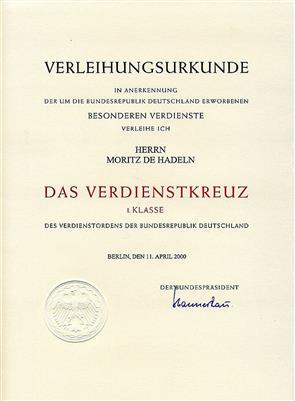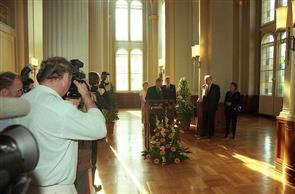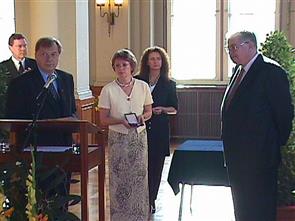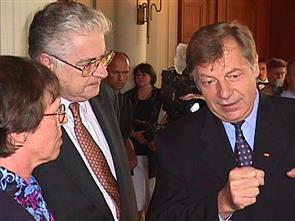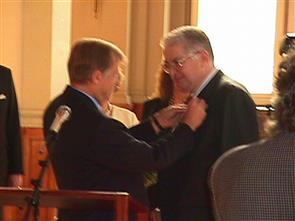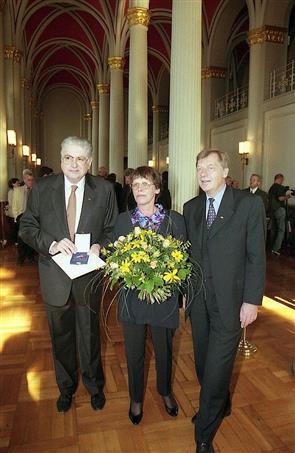
Rede des Regierenden Bürgermeisters
von Berlin, Eberhard Diepgen,
anlässlich der Überreichung
des Verdienstkreuzes 1. Klasse des Verdienstordens der Bundesrepublik Deutschland
an Moritz de Hadeln am 29. September 2000
Zwanzig Jahre bedeuten fast eine Generation. Moritz de Hadeln stand in dieser Zeitspanne als Leiter den Internationalen Filmfestspielen vor. Als er 1979 sein Amt antrat, war zuallererst sein diplomatisches Geschick gefragt, denn damals war der Film in Berlin eine hochpolitische Angelegenheit und fast eine völkerrechtliche Herausforderung. Das zeigt im Kleinen noch einmal eindrucksvoll, in welch einer Welt im Wandel wir in Berlin in den letzten zwei Jahrzehnten gelebt haben.
Die Berlinale in der geteilten Stadt war eine Veranstaltung, an der man den Stand der Ost-West-Beziehungen ablesen konnte. Hier hatte das Kino eine Nebenrolle auf der Bühne des kalten Krieges. Es war vor diesem Hintergrund sicherlich kein Nachteil, dass mit Moritz de Hadeln ein schon wegen seiner Schweizer Herkunft der Neutralität verpflichteter Charakter das Amt antrat.
Dabei sind Sie, sehr geehrter Herr de Hadeln. ein Weltenbürger im Sinne des Wortes. Sie sind ein Mensch mit vielen Wurzeln in Europa. Kosmopolitisch ist Ihre Herkunft, international der Lebensweg. Nach Ihrer Schulausbildung in Italien, Frankreich und der Schweiz gingen Sie zunächst nach Paris an die Sorbonne. Schon während des Studiums wuchs Ihre Leidenschaft für den Film und die Photographie zu einer unstillbaren Liebe zum Bild. Als Photograph, Regieassistent und Cutter ebneten Sie sich selbst den Weg, der mit der Leitung der Filmfestspiele zunächst in Locarno und dann in Berlin auf die Gipfel des Filmfestivals führte.
Sie haben das Ansehen des Berliner Filmfestivals nicht nur beständig gefestigt, sondern auch programmatisch und organisatorisch weiter entwickelt. Die Filmfestspiele in Berlin haben durch Sie, verehrter Moritz de Hadeln, wichtige Akzente und Anregungen erhalten. Auch Ihre polyglotte Weltoffenheit trug wesentlich dazu bei, den internationalen Charakter der Filmfestspiele noch zu verstärken. Es gelang ihnen nicht nur in den Zeiten der Teilung, die Filmfestspiele als Ort der Begegnung zwischen Ost und West zu einer Institution im kulturellen Dialog zu machen. Die Festspiele haben unter ihrer Regie auch unseren Blick auf das Kino Asiens weiten helfen.
Dank Ihres außergewöhnlichen und leidenschaftlichen Engagements ist es in den vergangenen zwei Jahrzehnten gelungen, die Berlinale neben den Filmfestspielen in Cannes und Venedig als ein weiteres bedeutsames europäisches Filmfestival von internationalem Rang und überregionaler Ausstrahlung zu etablieren. Nach dem Fall der Mauer und der Wiedervereinigung Deutschlands machten Sie die Filmfestspiele zu einer der prestigeträchtigsten Begegnungsstätten der neuen Hauptstadt.
Mit dem Umzug der Berlinale an den Potsdamer Platz, der ein anstrengendes Unterfangen war, begann ein neues Kapitel in der Geschichte der Firmfestspiele. Es war für uns alle ein bewegender Moment, die Berlinale an einem Ort zu wissen, der wenige Jahre zuvor in einem Film eine große Rolle spielte, dessen Zukunft außerhalb des Kinos eher unbestimmt war. Die Wiedergeburt des Potsdamer Platzes ist ein Wunder, an dem auch Sie, verehrter Moritz de Hadeln, mitgewirkt haben.
Die Berlinale bleibt auch in Zukunft durch ihre Größe und ihre Vielfalt eine Herausforderung. Sie wird mit dem Wandel in der Welt, der in Berlin besonders stark war, Schritt halten müssen. Der Umzug an den Potsdamer Platz und das stärkere Engagement des Bundes für die Berliner Festspiele sind Indizien dafür, dass wir neue Wege suchen, um der Berlinale für die Zukunft ihren Ort und ihren Rang zu sichern.
Ich darf Ihnen, verehrter Herr de Hadeln, sehr herzlich danken für ihren Einsatz für die Berliner Filmfestspiele und Ihnen im Namen des Herrn Bundespräsidenten nun das Verdienstkreuz 1. Klasse des Verdienstordens der Bundesrepublik Deutschland Überreichen.
Twenty years are nearly a generation. Moritz de Hadeln headed the Berlin International Film Festival for all of that time. When he arrived in 1979 it was above all his diplomatic skill that was needed, because at that time, film in Berlin was a highly political affair and almost a human rights challenge. This again indicates in small how much the world has changed for those who have lived in Berlin for the past two decades.
The Berlinale in a divided city was an event where East-West political relations were always in the forefront. Here, cinema played its part on the stage of the Cold War. With this background in mind, it was surely not a disadvantage that Moritz de Hadeln, with his Swiss background reflecting neutrality, became director of the Berlinale.
And yet, you, dear Mr. de Hadeln are really a citizen of the world par excellence. You are a person with many roots in Europe. Your background is cosmopolitan; your life journey has been international. After a school education in Italy, France and Switzerland you initially went to the Sorbonne in Paris. It was there during your university studies that your love for cinema and photography grew to an undying love for the moving picture. As a photographer, assistant director, and cutter you smoothed the way which led you initially to becoming director of the Locarno Film Festival and later of the Berlinale, at the summit of film festivals.
You not only consistently strengthened the film festival but also continued to develop it from program and organizational perspectives. The film festival in Berlin received important new accents and stimuli from you, dear Moritz de Hadeln. Your polyglot world openness substantially helped to strengthen the international nature of the festival. You were successful not only during the period when Berlin was divided to make of the film festival a meeting place between East and West, but also to make it an institution of cultural dialogue. The film festival under your leadership has also helped us widen our understanding of Asian cinema.
Thanks to your extraordinary and passionate engagement in the last two decades, the Berlinale has together with the film festivals in Cannes and Venice become another important European film festival of international reputation. After the fall of the Berlin Wall and the reunification of Germany, you made the film festival to one of the most prestigious events in the life of the new capital.
The move of the Berlinale to the Potsdamer Platz was a strenuous undertaking and began a new phase in the history of the festival. It was a very moving moment for us to know that the Berlinale was taking place on the location which only a few years before had played a central role in a film, but whose future, beyond cinema, was anything but certain. The rebirth of Potsdamer Platz is really a miracle, which you, my esteemed Moritz de Hadeln, have helped to make happen.
The Berlinale will in future continue to be a challenge because of its size and diversity. It will have to keep pace with the changes in the world, which also heavily affect Berlin. The move to Potsdamer Platz and the stronger involvement of the federal government in the Berlin Film Festival are evidence that we are looking for new ways to secure the future of the Berlinale, in Berlin as well as internationally.
I wish to deeply thank you, dear Mr. de Hadeln, for your continued commitment to the Berlin Film Festival and now, on behalf of the President of the Federal Republic of Germany, present to you the Cross of Merit, 1st Class, of the Order of Merit of the Federal Republic of Germany.



Address of the Lord Mayor of Berlin,
Eberhard Diepgen,
on awarding
the Cross of Merit, 1st Class, of Order of Merit of the Federal Republic of Germany
to Moritz de Hadeln, on September 29, 2000
